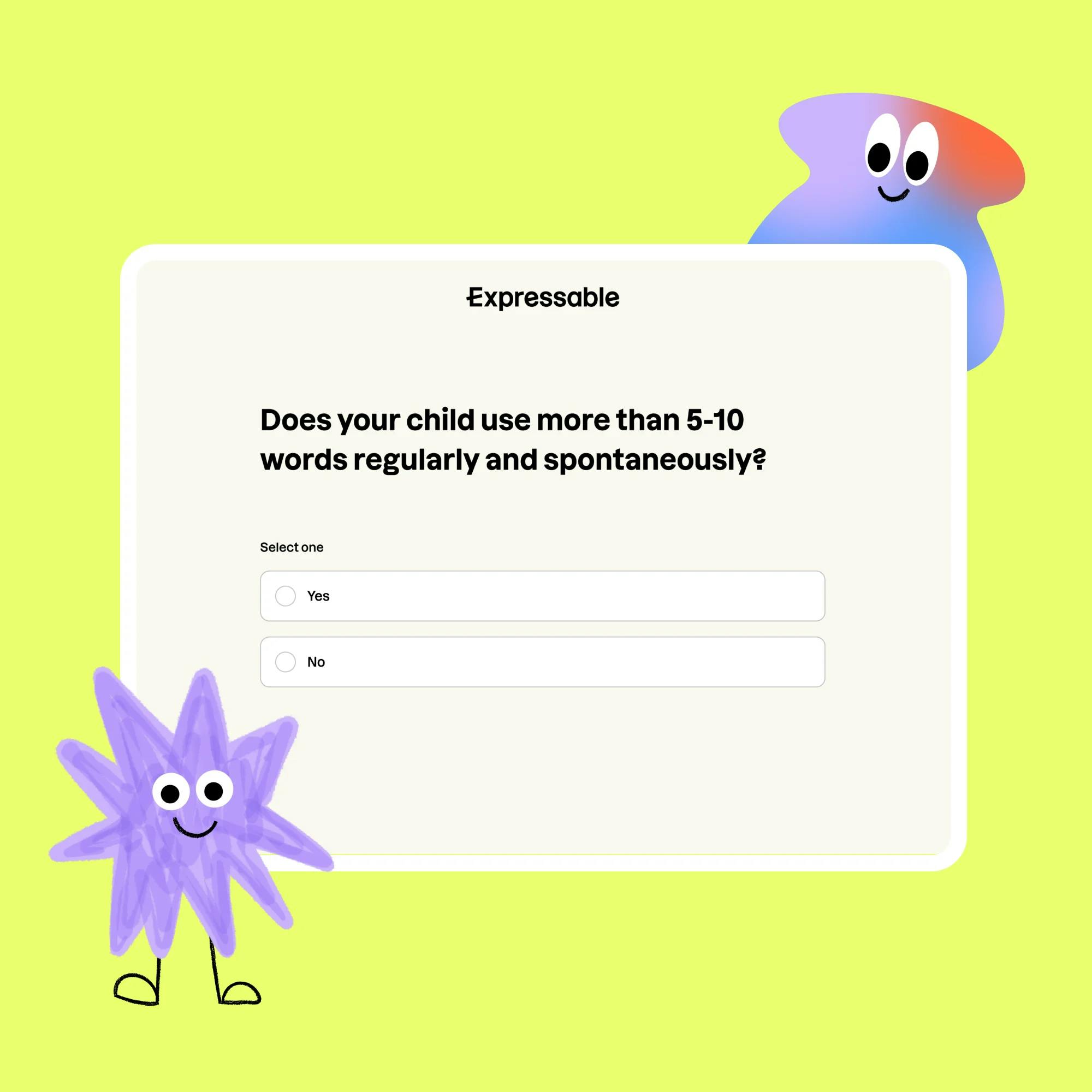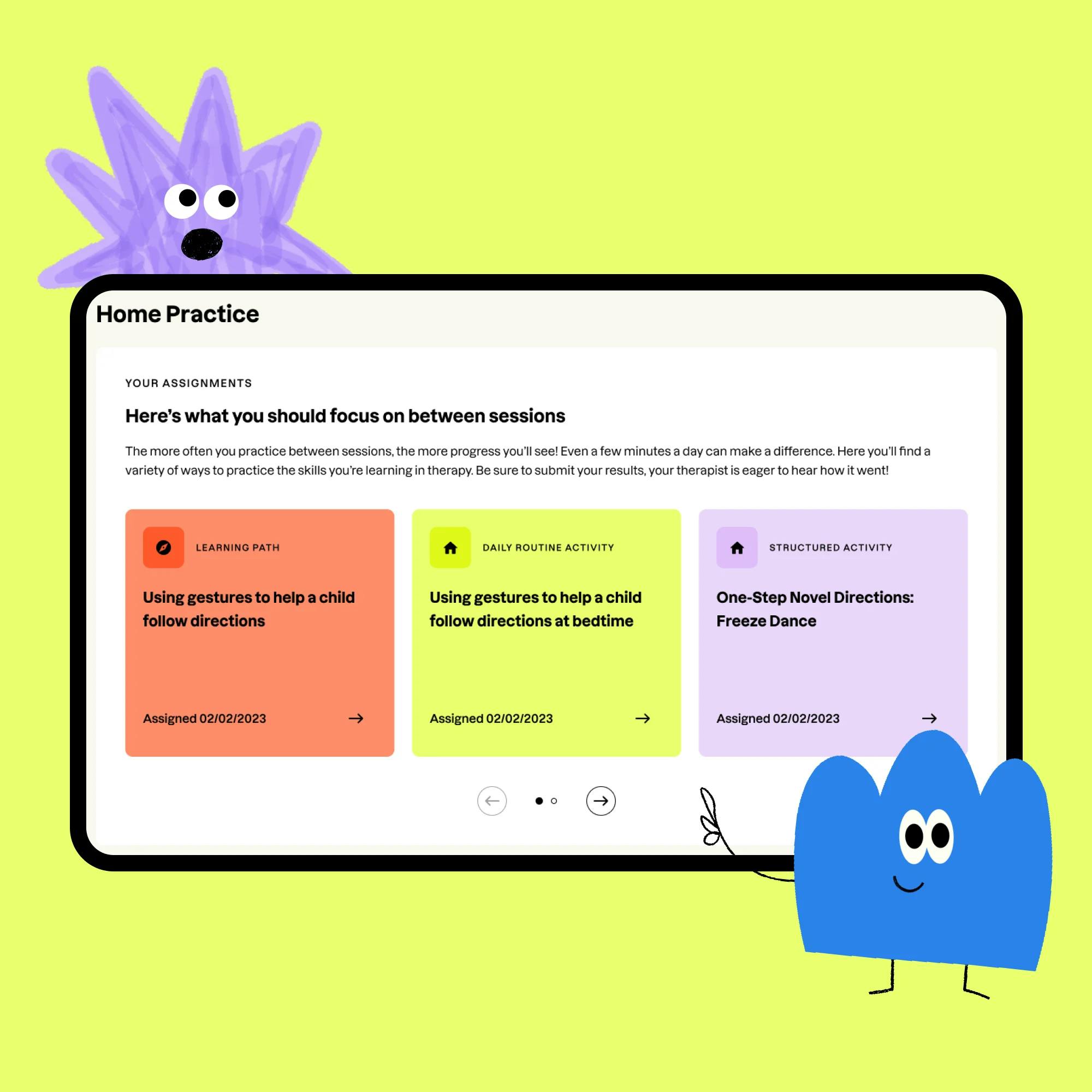
How to Find a Speech Therapist for Your Child (or Yourself)
 Leanne Sherred, M.S., CCC-SLP
Leanne Sherred, M.S., CCC-SLP
Families may look for a speech therapist for various reasons. Some get a speech therapy referral from their doctor or pediatrician. Others may notice their child struggling to communicate or falling behind others their age. Adults may seek speech therapy, too, for long-time speech issues or new problems related to an illness or injury.
When you’re ready to seek support, it’s time to choose a speech-language pathologist (SLP), also known as a speech therapist. Picking the right speech therapist isn’t always easy. You'll need to consider your or your child's unique needs, the therapist's qualifications, and your budget and schedule.
This guide will help you feel confident in your search for a speech therapist for yourself or your child. Let’s dive in!
What is a speech therapist vs. an SLP?
Before we talk about what to consider when choosing a speech therapist, let’s clear up two key terms. A speech-language pathologist (SLP) and a speech therapist are actually two names for the same thing. “SLP” is the formal term, typically used in professional or clinical contexts. “Speech therapist” is a more common term that people tend to use in everyday conversation.
Speech therapists (or SLPs) are trained professionals who help with speech, language, communication, and swallowing issues. A speech pathologist or therapist needs a master’s degree in speech-language pathology and a bachelor’s degree in a related field, such as communication sciences. They must also pass a national certification exam and apply for a license from their state.


5 places to find a speech therapist for yourself or your child
Finding a speech therapist might feel overwhelming, but here are five of the best places to start your search:
Contact Expressable: Expressable offers speech therapy online to children and adults all over the U.S. We'll match you with a therapist based on your needs and availability (including after school, evenings, and weekends).
Ask your doctor or pediatrician: Ask your healthcare provider or pediatrician if they can refer you to a local speech therapist. They often know the best SLPs in your area.
Check with your insurance company: If you have insurance, ask your provider. Call the number on the back of your card to ask about coverage for speech therapy. They may also suggest speech therapy providers in your network.
Search online directories: Websites like the American Speech-Language-Hearing Association (ASHA) can connect you with a long list of speech therapists (and audiologists, if you need one). You can search by location and specialty.
Look into college programs: You can check out local colleges with audiology or speech therapy programs. You can receive a diagnosis and treatment from a student under the supervision of a licensed therapist. While this can be a much more affordable option, note that you may work with a roster of different students.
Looking for a speech therapist?
We offer personalized, 1-on-1 sessions at a time that fits your schedule. Get matched with a speech therapist today.
 Get started
Get startedPrivate vs. at-school speech therapy options
There are two main settings where children receive speech therapy: in their school or through a private practice. Each location has its pros and cons. Let’s take a look at school-based vs. private speech therapy so you can make the best decision for your family.
School-based speech therapy
Speech therapy in a school is often the least expensive option. School speech therapists can work closely with a child’s teachers, which is another benefit. But some schools are short on staff or resources. This could mean long wait times and inconsistent schedules.
Most importantly, your child may not receive one-on-one therapy. Because so many students receive speech and language therapy at school, speech therapists often hold group sessions with several children, all with varying needs. Parents and caregivers may not be kept updated on what their child is learning in therapy and how to help them at home.
If you’re not sure about school-based speech therapy, it’s worth exploring private practice options. Many kids who go to school-based therapy also attend private speech therapy.
Private speech therapy
There are many advantages to private speech therapy. First, your child will get personalized attention and support from your speech therapist. The therapist will tailor instructions to your child’s communication strengths and goals.
Private speech therapy also allows you as a parent to develop a strong relationship with your child’s therapist. This makes it easier to stay informed on your child’s progress. Your speech therapist should give you strategies to support your child at home, which can help them improve faster.
Note that speech therapy services at a private clinic may cost more. But if you have insurance, your coverage could lower these costs.


5 tips to find the right speech therapist for your child
There are many wonderful speech therapists out there. The key is to find one that’s right for your family. At the end of the day, you should feel confident that your speech therapist has the skills to improve your child's communication.
The tips below will help you evaluate and choose the best speech therapist for your child.
1 Know your child’s speech therapy needs
Speech therapists treat a wide range of speech and language disorders. That’s why it’s important to find one with the right skills and experience for your child’s needs.
When choosing a speech therapist, consider if they have experience treating the issue your child is struggling with. Common conditions that speech therapists treat include:
Speech delay
Articulation disorders
Communication difficulties due to autism
Voice disorders
Stuttering
Aphasia
Apraxia
Feeding and swallowing problems
You’ll also want to consider your child’s age and any coexisting conditions. Some speech therapists specialize in early language development for toddlers. Others focus on helping school-aged kids, teenagers, or adults. If your child has other conditions like autism or a brain injury, it’s important to find a speech therapist who has experience with those needs.
Need help identifying your child's unique speech therapy needs? Get started with Expressable’s free screener. This short questionnaire will help you understand your child’s communication challenges and strengths, so you can find the right speech therapist for your family.
2 Check your SLP’s credentials and reviews
Make sure your speech therapist is certified by the American Speech-Language-Hearing Association (ASHA). This shows they have met rigorous education and clinical standards.
Next, check online reviews for any speech therapist you’re considering. Reviews from other parents and clients can tell you how the therapist works and communicates. Reviews also highlight the speech therapist's success with children like yours. This can help you feel more confident in your decision.
Considering online speech therapy? Check out Expressable’s reviews here and learn about other clients' experiences.


3 Look for a speech therapist who will partner and work closely with you
You'll want to find a speech therapist with whom you can build a trusting relationship. Speech therapy works best when caregivers join in. In fact, numerous research studies show that when parents and caregivers get involved, their children make much more progress in speech therapy. One study even found that parents were just as effective at helping their child as speech therapists were.
Think about it: Your child will only see their speech therapist for a short time each week. In contrast, they probably see you every day. The best speech therapists recognize this and encourage parental involvement.
Your speech therapist should show you simple ways to work practice into mealtime, playtime, or bedtime routines. With the right home practice strategies, you and your speech therapist can work together to help your child build their communication skills faster!
Make home practice even easier. Expressable therapists assign home practice activities after every session. Every Expressable client receives access to our online client portal, packed with tips, videos, and activities. You can also text with your speech therapist throughout the week to ask questions and get support when you need it.
4 Consider insurance and speech therapy cost
Speech therapy is often covered by insurance, so be sure to ask potential SLPs if they accept your provider, whether it's a commercial plan, Medicaid, or Medicare. Many speech therapists work with major insurance providers, but coverage varies widely by plan.
What if you don’t have insurance? Ask about out-of-pocket costs for speech therapy and whether payment plans are offered. Understanding costs upfront will allow you to make an informed decision about your or your child’s care.
5 Look for a speech therapist who fits your schedule
Consistency is important in speech therapy. Look for a therapist who has flexible hours, such as after school, evening, and weekend appointments. These options are perfect for professionals and busy families. If it’s hard to make it to an office, consider online speech therapy. You can attend sessions from the comfort of your home with just an internet connection.


Choosing online vs. in-person speech therapy
Not long ago, speech therapy required clients and therapists to be in the same room. Today, telehealth allows us to choose how we receive health care services, including speech therapy.
However, where you have speech therapy isn't nearly as important as your relationship with your SLP, as well as how involved you are as a parent or caregiver. In fact, research has shown that online speech therapy is just as effective as in-person therapy.
So how do you decide what’s best? Keep reading to discover the pros and cons of both in-person and online speech therapy, so you can make the right choice for your family.
Get matched with a speech therapist who's right for you
Get started nowIn-person speech therapy
Many speech therapists take clients in person at a local office. While this is a great fit for some families, others might find it challenging to commit to a weekly in-person appointment.
In-person speech therapy may be a good choice for people with:
High needs: Some people need more intensive therapy that requires a hands-on approach, such as certain feeding and swallowing issues.
Multidisciplinary therapy: For example, if a child is also receiving occupational therapy (OT) or physical therapy (PT), it can be convenient to have sessions in the same building.
That said, there are some downsides to in-person speech therapy:
Getting there: If you choose in-office speech therapy, you have to spend time and money on transportation. Bad weather or traffic can add extra stress.
Finding time: You have to go when the speech therapist’s office is open. It might be hard to fit sessions around your job, school, and family life.
Lack of caregiver involvement: If you’re short on time, it can be tough to join your child’s in-person appointments. That means you’ll miss the chance to get involved with your child’s care and learn strategies for at-home practice. As we discussed earlier, this can delay your child’s progress.


Online speech therapy
Online speech therapy works just as well as traditional, in-person care. The only difference is that you use video conferencing software. Online speech therapy also offers these benefits:
Easy caregiver involvement: It's easy for parents and caregivers to attend online speech therapy with their child. You can form a relationship with the therapist, track your child's progress, and learn how to help them practice. When you practice the techniques your child is learning with them at home, between sessions, it leads to faster progress!
Convenience: No commute time needed! Simply turn on the computer or tablet, and your therapy session can begin.
Flexible scheduling: Online speech therapy is often available in the evening or on weekends. That means you won’t have to miss work, skip after-school activities, or rearrange your schedule to get your child to their speech therapy appointment.
Home environment: Children are often more comfortable at home, where their favorite toys and activities can be used during sessions.
Some downsides to consider include:
Technology needs: For online speech therapy, you need to have a reliable internet connection.
Lack of hands-on help: The speech therapist can’t physically guide your mouth movements or use special tools. (They use other cues instead.)
If you choose online speech therapy, make sure you find a speech therapist who’s experienced with teletherapy. Online speech therapists need to know how to keep children engaged in a virtual setting. For example, they might play interactive computer games, use fun screen backgrounds, or give your child remote access to draw on a virtual whiteboard. They should also know how to involve parents and coach them on therapy techniques, as described above.
Find a speech therapist with confidence
When you find the right speech therapist, you take a big step toward improving your or your child’s communication skills and quality of life. Consider the speech therapist's credentials, insurance options, and scheduling flexibility to make an informed decision. Don’t forget to trust your instincts and ask questions throughout the process, too.
Ready to get started with Expressable? Click here to get matched with the right speech therapist for your or your child’s unique needs.
Frequently asked questions about starting speech therapy
How are speech and language problems diagnosed?
Your first speech therapy session will be a comprehensive evaluation. Your speech therapist will ask questions about your child's medical history and your concerns. They'll perform standardized or norm-referenced tests, along with other exercises to assess your child's speech and language skills. The evaluation results will determine your child's goals and treatment plan.
At what age can a child start speech therapy?
There is no minimum age to start speech therapy. Building language skills in toddlers and young children can set the foundation for strong communication and literacy skills later on. Speech therapy is particularly important for kids who aren’t reaching milestones on time, or who have difficulties such as stuttering or a lisp. Because speech and language patterns become more ingrained over time, the earlier speech errors can be corrected, the better the outcomes are likely to be.
How long does speech therapy take?
The length of speech therapy is different for each unique person. Many factors can contribute to how long a person needs to be in speech therapy. They include the severity of the communication issue, how long the person has had the problem, how consistently they’re able to attend sessions, and how often they practice at home. You can learn more in this article.
Does online speech therapy work for toddlers?
Yes! A speech therapist shouldn't expect a toddler to sit still and pay attention to a screen for 30 minutes. While sessions will be play-based, using the child's favorite toys and activities, the key is parent involvement. Your therapist should focus on parent coaching, giving you the tools, knowledge, and techniques you need to help your child at home. Learn more about online speech therapy for toddlers in this article.
How Expressable Can Help
Concerned your child isn't reaching age-expected milestones? Looking for communication support from a professional? Expressable is a national online speech therapy practice serving children and adults. We treat all major areas of communication and feeding, offer flexible hours including evenings and weekends, and accept most major health insurance plans. We’re proud to have earned more than 3,000 5-star reviews from our clients (4.9/5 average).
Our therapy model is centered on parent and caregiver involvement. Research proves that empowering caregivers to participate in their loved one’s therapy leads to better outcomes. That’s why we combine live, 1-on-1 speech therapy with personalized education and home practice activities for faster progress.
Communication is more than words. It’s how we share how we feel and show who we are. We’re here to help you or your child do just that.










